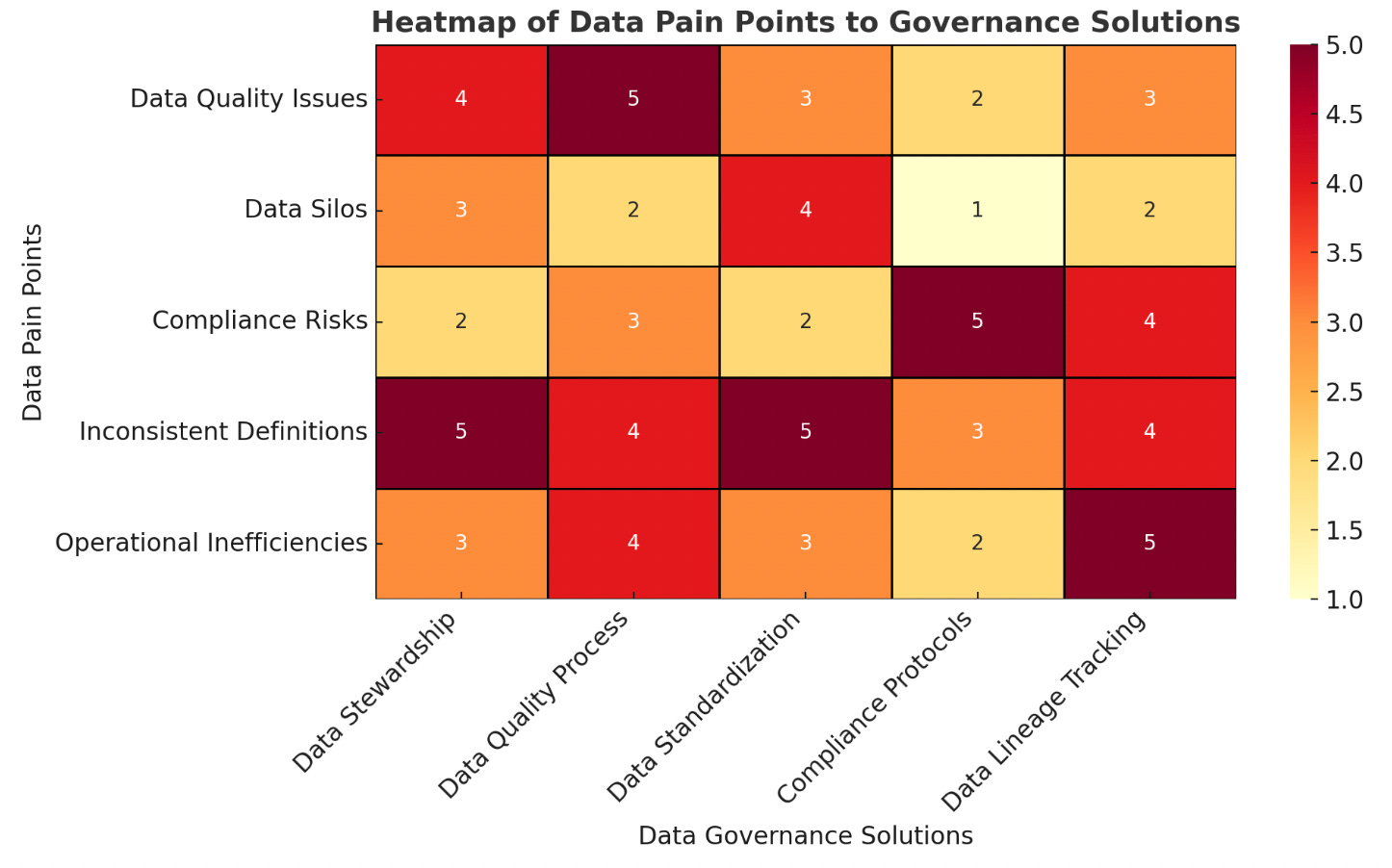Hello 😀
On my last LinkedIn survey, 42% of you mentioned buy-in and ROI as your biggest data governance challenge. I’m not surprised…
If you haven't already, you can also :
Discover my coaching services
Join +200 readers of “Data Governance : where to start?”
Let’s brainstorm ideas 👇
Agenda
What for?
The 5 best ideas
Start now
What for?
That’s the first question I ask to my clients.
“Who’s sponsoring your data governance initiatives?”
👉 If the answer is unclear - let’s stop here - that’s a way bigger problem than your data quality issues.
Executive sponsors, often high-level executives like the CDO, CFO, or CIO, act as the driving force behind data governance initiatives within the organization. Their leadership is essential to secure the program's success.
But be careful, there are 2 types of sponsors.
1️⃣ The easy one is a Data Sponsor. Obviously if you’re in the organization, a Data Sponsor (aka CDO, CIO, CTO) have supported your recruitment or assignment.
2️⃣ What you really need is a Business Sponsor. Meaning a head of business department : Marketing, Logistics, HR, Operations, Strategy, Sales, etc. Having a Business sponsor is much more powerful :
It ensures that governance efforts are aligned with business goals.
Business sponsors have the authority to enforce governance policies across departments.
They are able to allocate resource and budget to initiatives that they define as top priority.
When a business sponsor endorses data governance, it becomes easier to achieve buy-in from other stakeholders.
The 5 best ideas
Let’s see how you could convince a Business leader to support Data Governance.
#1 Showcase ROI through efficiency gains
Demonstrate how proper governance reduces time spent on data cleanup, data manipulation and overall improves operational efficiency.
👉 I’ve talked about my ROI method in a previous newsletter :
Perform at least 10 interviews with operational team members
Estimate the data workload of people
Highlight the biggest workloads in a presentation
Explain how to tackle them with simple solutions
#2 Present data quality issues as business risks
Quantify the risks associated with poor data quality (e.g., lost sales, inaccurate forecasting) to emphasize the need for governance.
Let’s take an example.
I’ve been working on a dynamic pricing project for a client. He knew there were a lot of data quality risks on the project, but stakeholders were not receptive to his warnings.
One day, we just started saying that :
“If the inputs on product data were done wrong, it would lead to wrong pricing and immediate lost revenues.”
👉 Suddenly the data risks were taken seriously.
#3 Highlight competitive advantage
Showcase how a solid data governance framework enables better customer insights, faster time to market, and improved agility.
To beat the market, you need :
To personalize the shopping experience?
💡 Need to have a holistic view of your customer across online and physical stores
To manage the performance of your products?
💡 Need to collect data about product usage
To enable accurate route optimization and faster deliveries?
💡 Need to maintain high-quality data on delivery routes and packages
Well, all these needs are part of Data Governance initiatives.
#4 Use success stories
Present case studies from other companies in similar industries that have seen significant benefits from investing in data governance.
Take the example of ALDO Group.
They started with a small initiative, proved the value with a “quick-win” type mentality and built credibility.
You could share their use case to your business leaders :
0️⃣ Starting point is a product quality control process done through manual data entries into Excel.
1️⃣ They standardized a data entry form with instantaneous automatic defects detection.
2️⃣ Data is then updated to Aldo’s BI data warehouse in real-time and is governed by the data warehousing team.
3️⃣ Finally they run predictive analytics, find patterns and trends, and visualise issues with trusted data.
The initiative was small and inexpensive, but it resulted in a 1500% in ROI and governance over their data captured throughout the process.
#5 Use dashboards to show metrics
Use dashboards to share some bad metrics who are actually the result of a poor data governance. It could be :
Discrepancy rate on a key number like “Revenues”
Average time spent on data cleansing vs standard time in your industry
Increase over time of the rate of duplicate data
Long data access request times
Start now
Stop procrastinating on this topic. Start now.
Know your targets
List all potential stakeholders across departments (IT, Finance, Marketing, Sales, etc.) who are impacted by poor data governance.
Prioritize stakeholders who have the most influence over business revenues.
Research each stakeholder’s role, objectives, and potential pain points related to data by chatting with members of their team.
Conduct initial interviews
Hold preliminary interviews with these key stakeholders to understand their business challenges, pain points and expectations around “data”.
😅 Don’t use the word data governance.
Map pain points to data governance solutions
Synthesize pain points and translate them into data governance terms (data silos, inconsistent data, security risks).
For each term, define data governance solutions that could resolve or mitigate these issues (data stewardship, data standardization).
It should look like this :
Develop a sponsorship value proposition
Based on heatmap, draft a clear value proposition for potential sponsors, highlighting their role, the benefits they’ll gain from data governance solutions, and the positive impact on their department.
Start your presentation with an example from our previous 5 ideas (ROI, business risks, competitive advantage, success story or metrics) to make it more concrete.
Meet again with the key stakeholders to discuss your value proposition and adjust it with their feedback.
Ask these stakeholders who could sponsor the value proposition - it could be themselves !
Meet individually potential sponsors identified to present the value proposition and the expected outcomes.
Hope it helped, let me know who are your data governance sponsors !
See you soon,
Charlotte
I'm Charlotte Ledoux, freelance in Data & AI Governance.
You can follow me on Linkedin !





